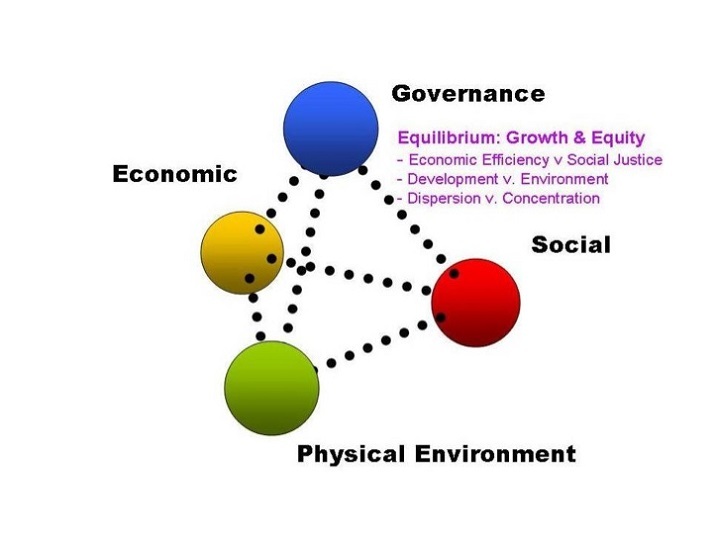
 Data Structure
Data Structure Networking
Networking RDBMS
RDBMS Operating System
Operating System Java
Java MS Excel
MS Excel iOS
iOS HTML
HTML CSS
CSS Android
Android Python
Python C Programming
C Programming C++
C++ C#
C# MongoDB
MongoDB MySQL
MySQL Javascript
Javascript PHP
PHP
- Selected Reading
- UPSC IAS Exams Notes
- Developer's Best Practices
- Questions and Answers
- Effective Resume Writing
- HR Interview Questions
- Computer Glossary
- Who is Who
Economic Planning
Introduction: What is Planning?
Planning is an activity every manager must resort to in order to set a path to obtain a goal in a given period of time. It includes defining some objectives, designing the paths to obtain the objective, and selecting certain paths out of numerous alternatives. Planning is not just a part of business, people need to plan in their day-to-day lives as well. However, it is mostly associated with commerce usually.
Planning is a process of defining objectives for the future. However, there is always a timeline for planning because no one can plan for an indefinite period of time. That is why planning is considered a very important aspect of management. If planning is done correctly, the goals of the management and the business in broader terms will be achieved without any bottleneck.
Planning is a very essential part of business irrespective of whether it is an organization run by private or public or whether it is owned by a sole proprietor. Every manager or owner must decipher what to do, how to do it, and when to do it in order to achieve business goals and that is exactly what planning is all about.
Example: A Metropolitan Planning

Economic Planning
Planning is the management process in which decisions are taken about the future. Every business manager must know what to do, why to do it, how to do it, and when to do it to get the desired result out of business operations. That is why planning is required at all levels and departments of a business. Managers are tasked with primarily the planning process to achieve business targets in a certain period of time.
Apart from businesses, governments, NGOs, and even individuals engage in planning for the future. However, the nature and process of economic planning are different for different entities depending on which goals are set. Economic Planning requires adequate knowledge of resources and managers must understand their business processes and the environment in order to do planning that results in the goals set by the planners.
Execution is probably the most important and critical part of planning where managers need to stick to decisions. For this, creativity and innovation are vital. In fact, managers who have good skills must also have creativity and innovation to execute the plans. That is why these personal attributes are considered so important in business organizations.
Accuracy in determining the appropriate goals is also a very essential part of planning. It is so because an organization cannot choose many ways to achieve its goals. There can only be a few paths going through which businesses must achieve their targets. Therefore, planning involves choosing one action plan over another and managers must be able to choose the right path ahead of the action to reach the goals in a given period of time.
Importance of Economic Planning
One of the most important benefits of any planning is that it sets achievable goals and also sets the direction for achieving them. Once the planning is done, all workers of an organization come to know about the plan and the direction in which they must work to achieve the goals set in the plan. This means that instead of going in different directions, the workforce of an organization will move in sync in order to achieve the goals. Without planning workers may go in numerous directions which cannot help the organization in achieving the target.
Planning saves enough time and resources by eliminating unnecessary and inefficient activities. As planning shows the direction in which the entire organization must move, it brings a synergy in the operation of the organization where all departments take part and work in sync. It helps in integrating the activities of all employees and removes the clutter that may arise when there in no future plan for managers and employees to follow.
Planning encourages creativity and innovation. In order to achieve business goals, managers need to think creatively about task-specific ideas. This helps them to think rationally, and creatively. This adds innovation to the business processes. Therefore, planning inculcates the culmination of ideas where managers must think creatively.
The Process of Economic planning
Setting the goals
All businesses and organizations start their plans by establishing goals as the policies and methods followed by the organizations are dependent on goals. In order to set goals, managers must know the aims of the organization and they should also have a realistic view of the financial and human resources of the organization. No organization can plan for improvement or more profits without setting the objectives right.
Assuming the plan of action
Making assumptions for the future is known as a premise in business terms. The plans that are applicable on-site are formed up from the ground. Premises are actually forecasts that are formed by taking prior knowledge and current plans about the future. A complete agreement is needed in the case of all premises. Managers assume the future depending on these forecasts. Forecasts are a process of accumulating information about various activities. These are used to predict the demand for a product, government policies, competitors' policies, and tax rates, etc.
Shortlisting the assumptions
Managers must shortlist the possible alternatives because an organization cannot move in all directions. The premises set in the previous step are therefore organized and categorized in order to select the best and doable options.
Evaluation of the best alternatives
After shortlisting the best premises, the managers the pros and cons of each alternative. The options that have more drawbacks than advantages are skipped while those with greater viability and profitability are chosen by the managers. The ultimate idea is to choose the best premise in order to set the goals as positive and effective as possible.
Follow Up
The managers must keep an eye on while executing the plans to judge whether the desired and set results are being obtained. If plans seem not to work, they should immediately change the strategy so that desired outcomes are obtained.
Conclusion
Planning is an unavoidable part of businesses. It is the method that is indispensable for earning profits and leading the organization to the desired level of growth. That is why organizations, both big and small, provide so much importance and dependence on planning. In other words, as accurate planning goes a long way in securing the future of an organization, it is considered an inseparable part of every business.
FAQs
What is planning? Describe briefly.
Planning is an activity every manager must resort to in order to set a path to obtain a goal in a given period of time. It includes defining some objectives, designing the paths to obtain the objective, and selecting certain paths out of numerous alternatives.
Give two reasons why planning is important.
Planning sets the direction in which an organization should move.
Planning saves time and resources for organizations by removing unnecessary activities.
What are the first two steps of planning?
The first two steps of planning are
Setting the goals
Assumption of the plan of action

